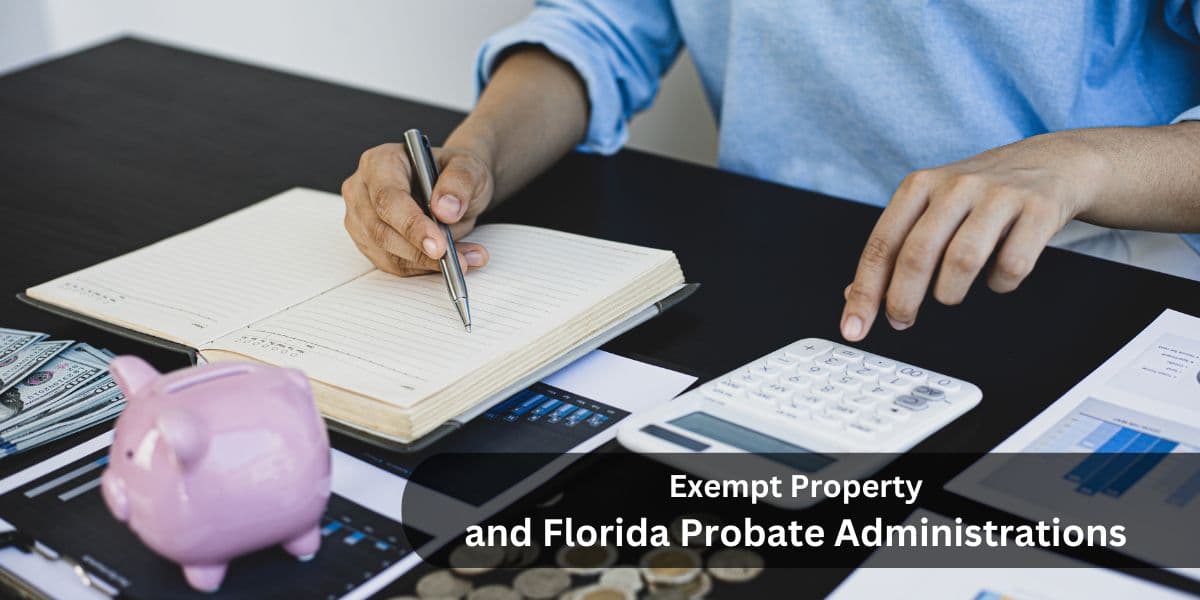
Exempt Property in Florida Probate Administrations
The probate process aims at winding up the decedent’s affairs following his or her passing. Part of the winding up process is satisfying creditor claims where the decedent owed monies at the time of his or her passing. Creditors include medical bills, credit card bills, personal loans, funeral home invoices, and the like. Creditor claims are payable only from assets subject to administration, or “unexempt” assets. Unexempt assets are liquidated and used to satisfy various creditor claims, including expenses associated with the administration of the estate, before being distributed to beneficiaries.
What Assets are Exempt?
Although unexempt assets may have to be liquidated to satisfy the claims of creditors, there are exempt assets which do not have to be liquidated to satisfy creditor claims. Protected assets, or “exempt” assets, in Florida probate administrations include the following:
1. The decedent’s residential homestead.
2. Up to $1,000.00 of personal property.
3. Household furniture, furnishings, and appliances in the decedent’s home up to a net value of $20,000.00 as of the decedent’s date of death.
4. Two motor vehicles held in the decedent’s name and regularly used by the decedent and his or her family as their personal motor vehicles.
5. Qualified tuition programs, including, but not limited to, the Florida Prepaid College Trust Fund advance contracts and participation agreements.
6. Certain death benefits payable to teachers and school administrators.
7. Family allowance for the surviving spouse or lineal heirs who were receiving support from the decedent up to a value of $18,000.00.
8. Additional statutory exemptions, as applicable, such as life insurance policies, cash surrender value of life insurance policies and annuity contracts, wages or unemployment compensation, disability income benefits, pension money and certain tax-exempt funds, and those assets in qualifying medical savings accounts or hurricane savings accounts.
Who Can Claim Exempt Assets?
Exempt assets may be claimed in estates where the decedent was domiciled in Florida at the time of his or her death. Only certain individuals are entitled to have certain assets designated as “exempt property.” Those individuals include the surviving spouse, or, if there is no surviving spouse, the children of the decedent. See FL Statute 732.402(1).
How are Exempt Assets Determined?
Individuals entitled to exempt property must file a Petition to Determine Homestead Status of Real Property or a Petition for Determination of Exempt Property and have a Judge enter an Order deeming the assets as exempt or protected. The petition to determine exempt property must be filed four (4) months after being served with a Notice of Administration or forty (40) days after the termination date of any proceeding involving the construction, admission to probate, or validity of the decedent’s Will, or the right to claim said exemptions is deemed to be waived. See FL Statute 732.402(6).
What Does an Order Designating Assets as Exempt Do?
An Order Determining Exempt Property authorizes a personal representative to release the subject property to the appropriate parties, as determined by the facts of the case.
Are Exempt Assets Included in the Value of the Estate?
Property that is judicially determined to be exempt is excluded from the value of the estate before residuary, intestate, or pretermitted or elective shares are determined.
What if there is a Lien on an Exempt Asset?
Florida statute provides that exempt property is exempt from all claims against the estate, except for security interests on estate assets. See FL Statute 732.402(3).
If you recently lost a family member or loved one and need guidance on how to proceed, contact our office to schedule a complimentary consultation with one of our qualified Florida probate administration attorneys today.

